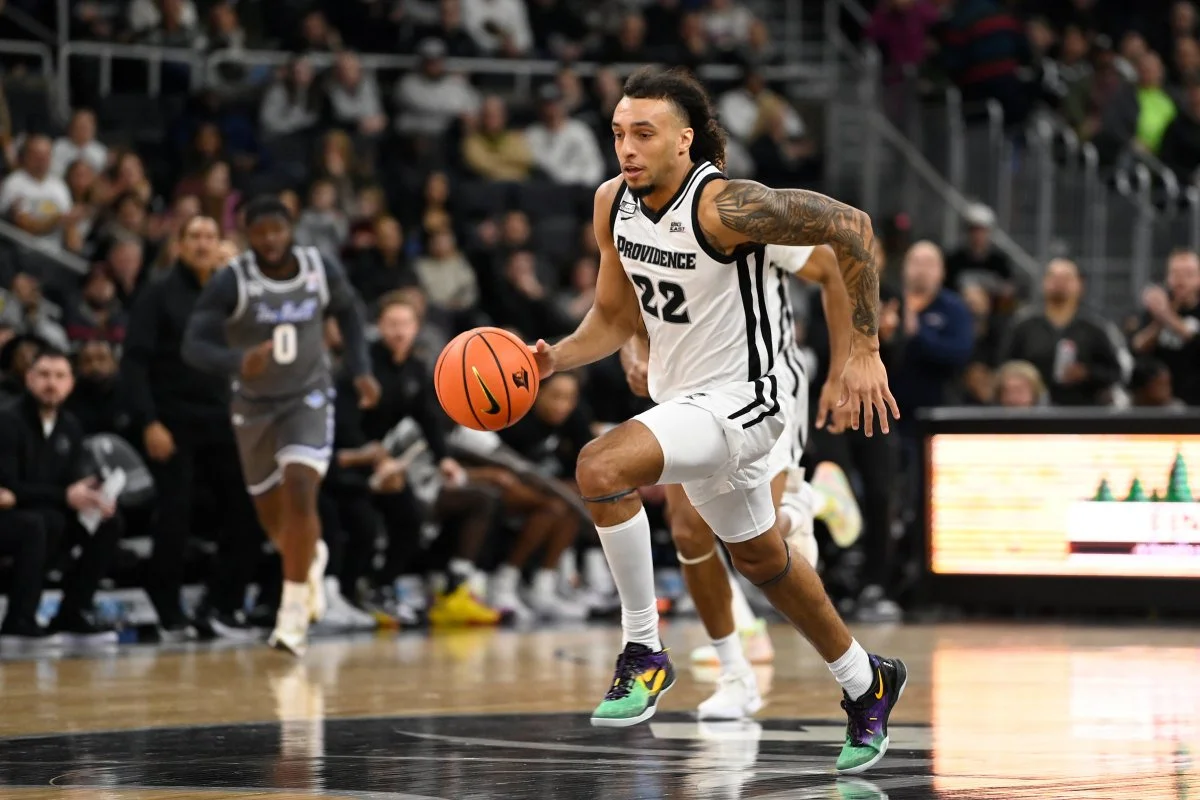Rookie Preview: How Does Devin Carter Fit with the Sacramento Kings?
The Sacramento Kings led the NBA in offensive rating for the 2022-2023 season on their way to securing the 3rd seed in the Western Conference. This past season, they dropped to 13th in the league in offensive rating, going from 118.6 to 116.2. Despite slightly improving their defense in the 2023-2024 season, the Kings finished 10th in the West and missed the playoffs after losing to the Pelicans in the play-in tournament. Securing the 13th pick in the NBA draft through the lottery, the Kings selected one of the most productive players in college basketball: Devin Carter. Let's dive into Carter's skill set and analyze his fit with the Kings’ current roster.
Defense
Carter is as good as it gets on the defensive end for a guard prospect. He’s got good size for a combo guard at 6’2.25” without shoes and a 6’8.75” wingspan. On top of good measurables, he tested as the bounciest player at the combine, ranking first in both standing (35.0”) and max vertical (42.0”). He also broke the all-time combine record for the three-quarter court sprint with a time of 2.87 seconds.
Carter's vertical and length contribute to his unique shot-blocking skills. He averaged over one block per game in both his sophomore and junior seasons at Providence. According to Bart Torkivs’ player stats database (which dates back to 2008), Devin Carter's block rate of 3.4% in his sophomore season is the highest block rate for any college basketball prospect that was listed as 6’3” or shorter. He posted a block rate of 2.8% this past season, which ranks 4th in the history of the database. Here are some clips showcasing Carter's shot blocking instincts.
Carter's historic defensive profile doesn't stop there. He averaged 8.7 rebounds per game in his junior year, including 7.7 defensive rebounds per game. His defensive rebound rate of 23.7% is by far the best value for any college basketball player that has been drafted at Carter's height. The Boston Celtics showed us that having guards that can block shots and provide help on the glass makes your defense extremely well-rounded. Among all guards in the league, Derrick White and Jrue Holiday both finished top 20 in rebounds and top 7 in blocks on their way to All-Defensive Second Team selections last season. Carter fits this archetype.
Carter uses his length and short-area quickness well when guarding the ball and jumping passing lanes. He uses his strength to make ball-handlers uncomfortable and is great at creating chaos on this end. His ability to make “splash” plays on defense is what you look for in elite defensive prospects.
Offense
Carter led the Big East Conference in points per game (19.7) on his way to winning Conference Player of the Year honors in his junior season. He improved his scoring every year in college, in large part due to jumps in his long-range shooting efficiency and volume. He went from shooting 6.5 threes per 100 possessions in his sophomore season to 11.2 per 100 in his junior year, while improving his three-point percentage from 29.9% to 37.7%. He showcased deep range and the ability to hit jumpers off the dribble. His form is a bit inconsistent and he has a low set point. Despite funky mechanics, he has a good arc on his jump-shot. It’ll be important to track Carter's development as a shooter in the NBA, as this will be the key for him to become a starting-level shooting guard in the league.
Carter isn't the flashiest finisher, but he uses his body well when getting to the rim. He does a good job of finishing off two feet and utilizing his strength to bully smaller guards. For guard prospects in this class that were 6’5” or shorter, Carter was the most efficient on close 2’s (118-181 for 65.2%) and led the group in dunks with 26 in his junior season. Carter should do most of his slashing in transition and attacking closeouts from the weak side in the league.
Improvement Areas
Carter will have to show that his shooting improvements are not just a one year “flash in the pan”. He was a fairly poor shooter his first two years in college, and his unorthodox release raises concern.
It will be interesting to see how good of a playmaker Carter is in the league. He doesn't have the tightest handle and lacks elite passing vision, which is the main reason I bill him as a shooting guard in the NBA. His assist to turnover ratio of 1.3 is fairly poor, especially considering how much he had the ball in his hands at providence (27.8 usage rate). With that being said, he shouldn't be asked to do too much high leverage passing next to De’Aaron Fox and Domantas Sabonis.
Summary/Team Fit
Devin Carter brings much-needed defensive playmaking to this Sacramento roster. With Davion Mitchell being traded to the Raptors, Carter can compete for guard minutes off the bench once he returns from injury. Long term, I think that Carter could be the starting shooting guard next to De'Aaron Fox. Despite playing point guard in college, Carter should be better suited in an off-ball role where he can use his energy on the defensive end, shoot spot-up threes, attack closeouts, and provide secondary playmaking. I love Carter's well-rounded skill set and think he has the potential to make All-Defensive teams down the road. He's a perfect fit with the Sacramento Kings, both in the present and long-term.
